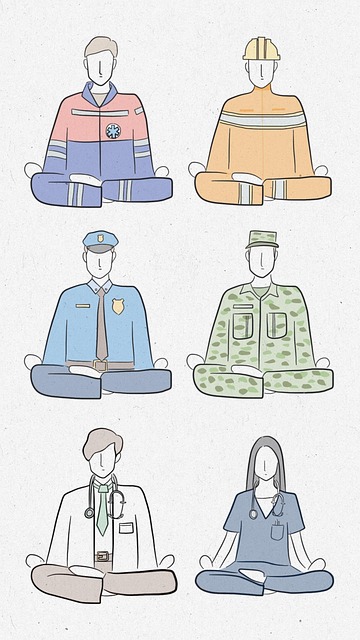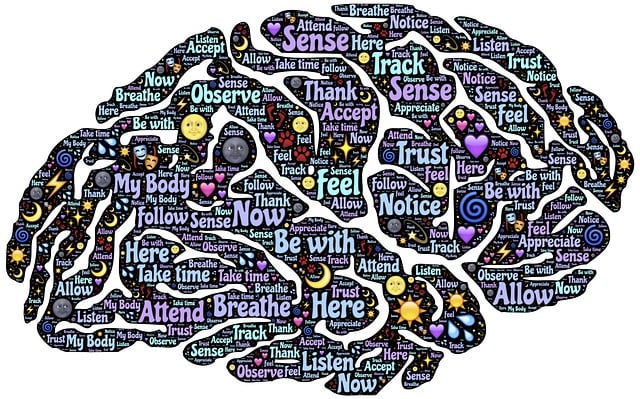Greenwood Village Mindfulness Therapy offers specialized support for mental health professionals facing challenges like secondary trauma and burnout due to intense emotional work with clients dealing with complex issues. They employ strategies such as Mindfulness Meditation and Compassion Cultivation Techniques, structured risk assessments, conflict resolution training, and continuous professional development to enhance emotional regulation, client safety, and treatment effectiveness. This holistic approach prioritizes both therapist self-care and the provision of cutting-edge mental wellness solutions, fostering positive transformations in a supportive environment.
Mental health professionals face unique risks on a daily basis. This article explores comprehensive risk assessment strategies tailored for this critical sector. We delve into understanding the specific challenges within mental health practice, introducing the framework of Greenwood Village Mindfulness Therapy as a guide. Key areas covered include hazard identification, vulnerable populations, and robust risk management. By implementing these strategies, professionals can ensure safe environments, foster resilience, and enhance patient care. Embrace effective monitoring, evaluation, and continuous learning for optimal mental health service delivery.
- Understanding the Unique Risks in Mental Health Practice
- Greenwood Village Mindfulness Therapy: A Framework for Assessment
- Identifying Potential Hazards and Vulnerable Populations
- Implementation of Effective Risk Management Strategies
- Continuous Monitoring, Evaluation, and Professional Development
Understanding the Unique Risks in Mental Health Practice

Mental health professionals, like those at Greenwood Village Mindfulness Therapy, encounter a unique set of risks in their practice that demand careful consideration. Unlike other therapeutic settings, the nature of mental health work often involves intense emotional engagement with clients dealing with complex and challenging issues. This dynamic can lead to potential secondary trauma, where practitioners may inadvertently absorb or reflect back their clients’ distress, leading to burnout or compassion fatigue if unaddressed.
Additionally, professionals in this field are increasingly incorporating practices like Mindfulness Meditation and Compassion Cultivation Techniques to support both their own emotional regulation and that of their clients. These tools are not only beneficial for cultivating resilience but also serve as strategies for navigating the inherent emotional intensity of mental health work. By integrating such techniques into their professional repertoire, therapists can enhance their ability to provide effective care while mitigating the unique risks associated with this specialized practice.
Greenwood Village Mindfulness Therapy: A Framework for Assessment

Greenwood Village Mindfulness Therapy offers a comprehensive framework for mental health professionals to conduct thorough risk assessments. This approach emphasizes the importance of understanding client backgrounds, current circumstances, and potential triggers to ensure safe and effective treatment. By implementing this framework, therapists can proactively manage risks and create a supportive environment that fosters mental wellness.
The process involves gathering detailed information about clients’ histories, including past traumas, substance abuse issues, and any relevant cultural or social factors. Additionally, it encourages professionals to regularly monitor client progress and be vigilant for emerging risks. This proactive assessment method not only benefits individual clients but also contributes to the development of public awareness campaigns and positive thinking initiatives within the mental health community, ultimately enhancing overall mental wellness.
Identifying Potential Hazards and Vulnerable Populations

Mental health professionals, much like their clients, operate within a complex web of potential risks and vulnerabilities. Identifying these hazards is a crucial first step in ensuring safe and effective practice, especially for those offering services in diverse settings like Greenwood Village Mindfulness Therapy. From navigating sensitive personal histories to understanding cultural nuances, professionals must be adept at recognizing the unique challenges each client brings.
When assessing risk, it’s essential to consider vulnerable populations, such as individuals experiencing trauma, anxiety disorders, or social isolation. These factors can significantly impact a person’s ability to cope and manage their mental health effectively. Through training in conflict resolution techniques, coping skills development, and social skills training, therapists at Greenwood Village Mindfulness Therapy can better equip themselves to support clients navigating these complex issues, fostering a safer and more supportive therapeutic environment.
Implementation of Effective Risk Management Strategies

In the context of mental health practice, effective risk management is paramount to ensure patient safety and well-being, especially in a setting like Greenwood Village Mindfulness Therapy. Implementing robust strategies involves a multifaceted approach. Firstly, professionals should prioritize self-care routine development for better mental health, incorporating practices such as mindfulness meditation to mitigate burnout and maintain optimal functioning. By fostering a healthy work-life balance, therapists can enhance their capacity to support clients effectively.
Additionally, integrating conflict resolution techniques into the risk management plan is strategic. These skills not only facilitate healthier interactions with patients but also equip professionals with tools to navigate challenging situations seamlessly. Through regular training and practice, mental health workers at Greenwood Village Mindfulness Therapy can ensure they remain adept at handling potential risks, thereby providing a secure and nurturing environment for both themselves and their clients.
Continuous Monitoring, Evaluation, and Professional Development

At Greenwood Village Mindfulness Therapy, we recognize that continuous monitoring and evaluation are cornerstones of effective mental health practice. Regularly assessing clients’ progress, along with ongoing professional development for therapists, ensures that treatments remain relevant and tailored to individual needs. This dynamic approach allows us to incorporate the latest research and communication strategies, such as those proven effective in Anxiety Relief and Depression Prevention.
Through rigorous internal evaluations, we foster an environment where therapists can openly discuss challenges and share best practices. This collaborative learning process not only strengthens our team’s skills but also enhances client outcomes. By staying at the forefront of evidence-based practices, Greenwood Village Mindfulness Therapy is committed to providing cutting-edge solutions for those seeking mental wellness, ultimately fostering more meaningful connections and positive transformations in our clients’ lives.
Mental health professionals face distinct risks in their practice, making it imperative to adopt robust risk assessment strategies. The Greenwood Village Mindfulness Therapy framework offers a comprehensive approach to identifying and mitigating these risks. By understanding potential hazards, recognizing vulnerable populations, and implementing effective management strategies, therapists can create safer working environments. Continuous monitoring, evaluation, and professional development are key to staying abreast of emerging challenges, ensuring optimal patient care, and fostering resilience within the mental health community.










